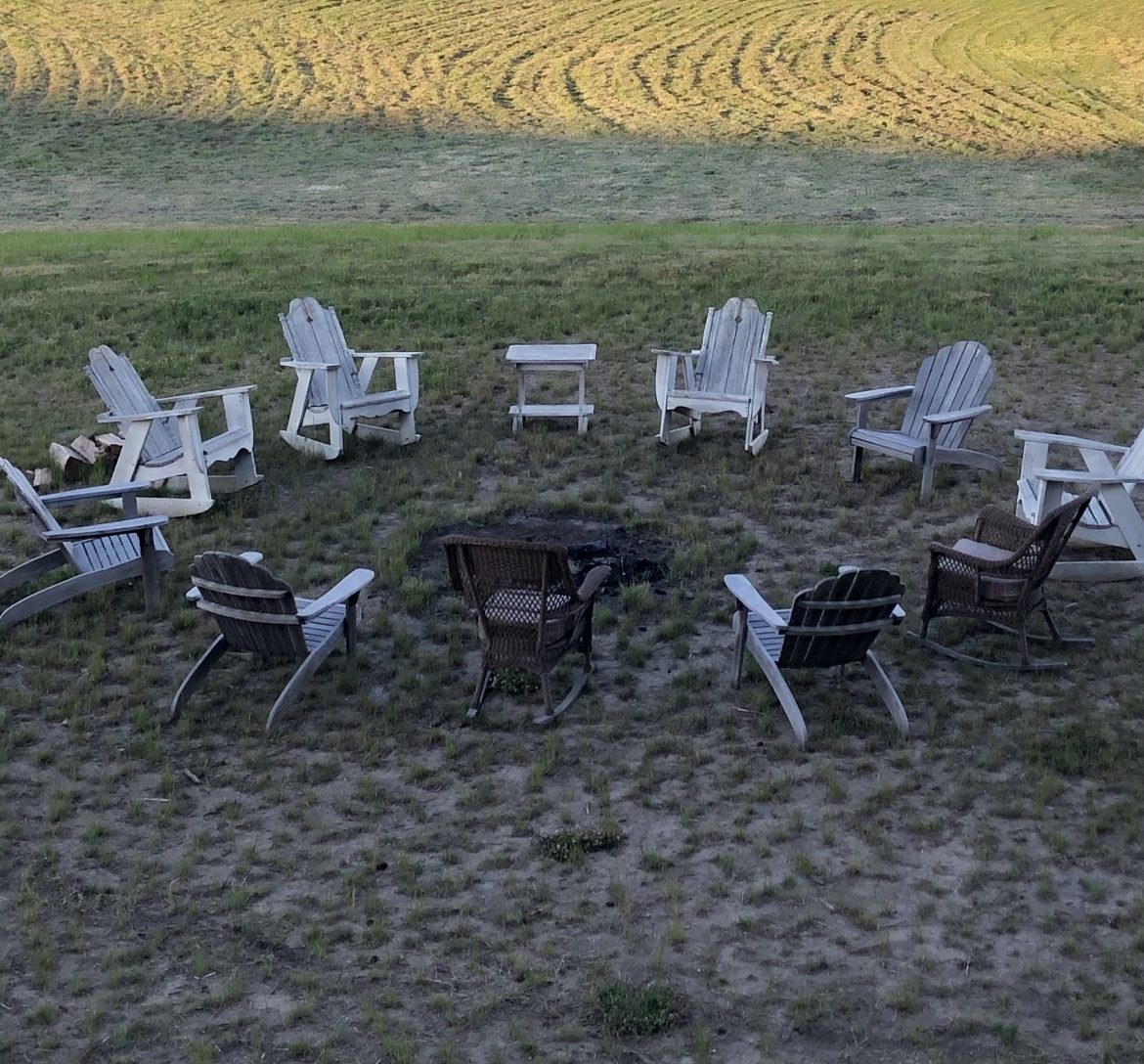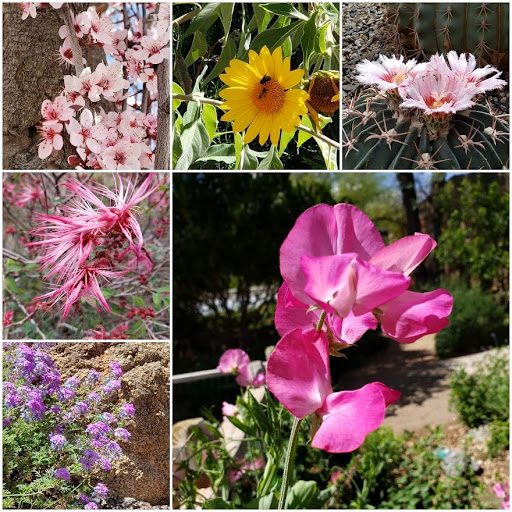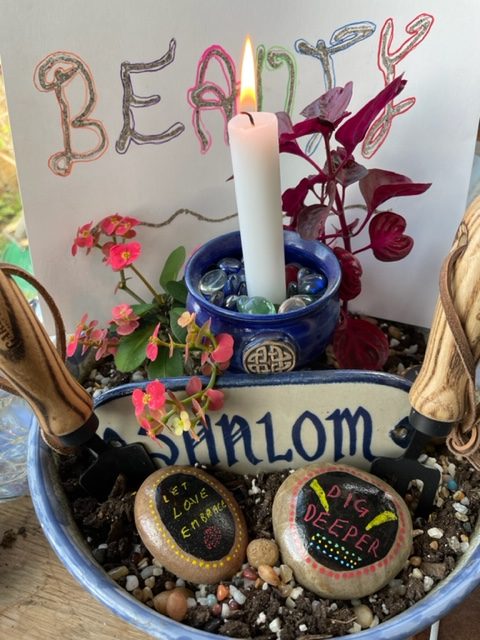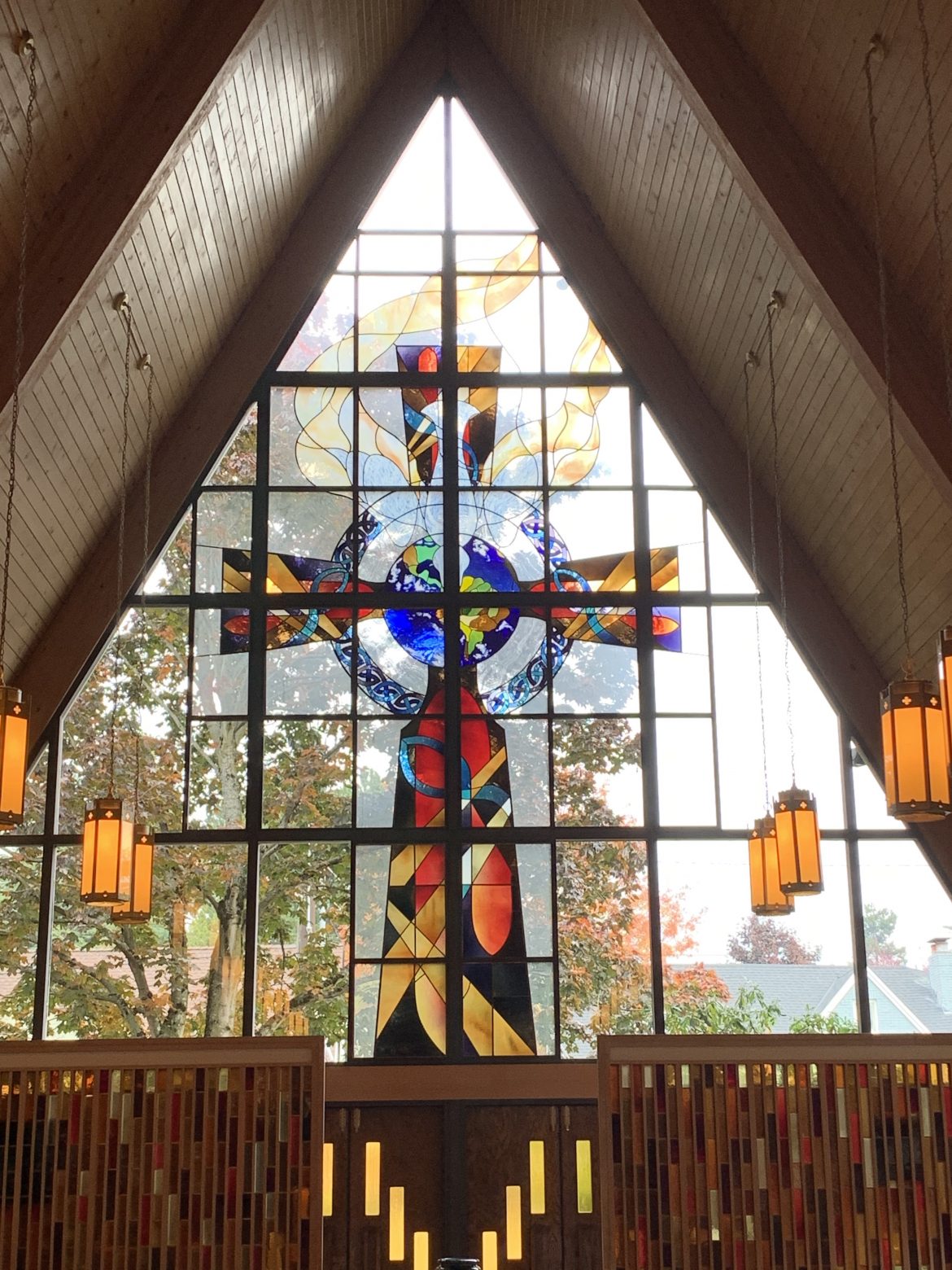by Melissa Taft
#ICYMI – a handy acronym for In Case You Missed It. There has been plenty going on here on Godspace – here are some highlights!
Godspace Light Community Group on Facebook
With nearly 2k members and growing, our little spot of community on Facebook is a lively place to be! Whether joining us for a Facebook Live, for a daily reflection from one of our members, or for a welcoming community sharing a wide variety of interesting topics, there is a little something for everyone. It’s a good way to keep up with all things Godspace and Christine Sine – events and upcoming releases, news from Christine and others, and even giveaways! You can find us at Godspace Light Community under groups on Facebook.
#ICYMI…the latest FB Live can be found uploaded a day or two later on Christine’s YouTube Channel as well as the group. The most recent one with Tom Sine on the topic of Earth Day was quite popular!
Socials
Of course, Facebook is not the only place you can find Christine. As I mentioned, if you’d like to watch the current Facebook Live but can’t participate live (or don’t have a Facebook account), you can always keep an eye on Christine’s YouTube channel. You can also find Godspace on Instagram, and Christine on LinkedIn, Twitter, Pinterest, and Instagram.
#ICYMI: Christine posted a hint at something very exciting on her Instagram!
Resources
Godspace continues to be a resource for many of you. Our Stations of the Cross post was one of the most popular over the past month – we pray it brought inspiration and blessing. Understandably, Ukraine is on our hearts and lips. Many of you found your way to this beautiful visual liturgy for Ukraine. In the past week, this Litany for Mother’s Day has captured attention. Just over a week away in the US – now is a good time to reflect and prepare.
ICYMI: Another popular post this week, Christine’s Meditation Monday: A Well Watered Garden hints of our current theme on Godspace Light and of things to come!
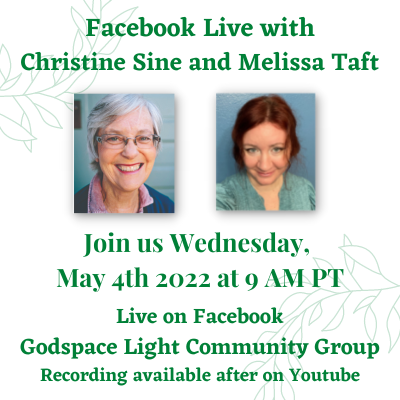 On Wednesday, May 4th at our regular time of 9 am PT, join Christine Sine and Melissa Taft for a discussion on Restoring Rhythms and Seasons. Live on Facebook in the Godspace Light Community Group. Can’t join us live? Catch it later on youtube!
On Wednesday, May 4th at our regular time of 9 am PT, join Christine Sine and Melissa Taft for a discussion on Restoring Rhythms and Seasons. Live on Facebook in the Godspace Light Community Group. Can’t join us live? Catch it later on youtube!
by Lilly Lewin and Kara K. Root
I am on the road for the next few weeks and will have some friends writing freerange Friday posts for me! Some of my favorite people, who are writers and creatives – and if you don’t know them you need to know them! First friend is Pastor and Spiritual Director Kara Root. I have learned many things from Kara over the years, but probably the biggest lesson is about practicing SABBATH. Her entire congregation practices Sabbath together! They gather for regular Sunday worship twice a month, and the other weekends they gather on Saturday night for more contemplative time, and then on Sunday they practice Sabbath on their own! If there is a fifth Sunday in the month they often go serve someone together. I think that if every church would start this practice, we’d have a lot less burned-out pastors and a lot more peace-filled people!
Kara has an amazing new book about her experience living out her faith in community with Lake Nokomis Presbyterian Church.
The Deepest Belonging: A Story about Discovering Where God Meets Us Paperback
“Are you tired? Worn out? Weighed down by heaviness? Come to me. Get away withme and you will recover your life. I will show you how to take a real rest. Walk with meand work with me—watch how I do it. Learn the unforced rhythms of grace. I won’t lay anything heavy or ill-fitting on you. Keep company with me and you will learn to live
freely and lightly.” (Mt. 11:28–30 adapted from The Message)
My grandfather was famous in our family for being able to “fit 10 lbs in a 5 lb box.” I inherited and honed this trait, and for much of my teenage and adult life I was a proud multitasker. I knew how to pack more things into less time, to wow people with my ability to accomplish.
But I slowly began to discover that while I could competently fit 10 lbs in a 5 lb box, I didn’t know how to fit 5 lbs. in a 5 lb. box. And 4 lbs. would have been impossible. I didn’t have any margins, any room, any rest. I could do many things at once but I could not do one thing. Or nothing. I was trying to be more than one human being, live more than the one human life. I was ignoring the perimeters, boundaries and limits God has given me. I was packing so much into my life and moving so fast, that I was not receiving my life as a gift to receive and enjoy, but turning my life into a task to accomplish.
For the past fifteen years, as a person, a parent, and a pastor, I have been learning about and practicing Sabbath. Sabbath is time dedicated on purpose for no activity other than to dwell in our own lives and let God meet us there. Sabbath reorients us to reality. When God led the Israelites in the wilderness, God gave them the Ten Words, or what we know as the Ten Commandments. These are descriptions of life of a free people with God in charge instead an enslaved people under Pharaoh. Hinged between the Words that describe belonging to God (the first three commandments) and the Words describing belonging to each other (the last five commandments) comes the longest and most detailed Word: “Keep the Sabbath.”
One day in seven, God says, you stop all work. You do this because you are not to be defined by your output or measured by your productivity. One day in seven everyone rests, and all distinctions that you erect to define your value and quantify your worth disappear. Old, young, rich, poor, slave, free, citizen, foreigner—you are all simply and completely human beings, alongside one another, all beloved children of God. This is the hardest lesson to absorb, so we have to practice it regularly, God tells us. We have to regularly step out of the mindset and activity of the world around us, the measuring, comparing, competing, striving, producing, and consuming. We have to regularly stop doing and practice just being. As all the other creatures and the earth itself already do, we must surrender to the cycles of rest and renewal that God built into the fabric of existence, which we are passionately determined to circumvent.
One day in seven, this Word says, those who belong to God on purpose remember that we are not God. And God’s people on purpose remember that we are neither better nor worse than anyone around us, but connected in a mutual belonging to God and each other. This is what it means to be human. This is what it means to be free. By stopping every week on purpose, we acknowledge that there is nothing we can’t set down and step away from. In fact, the urgency and control that keeps us constantly in the driver’s seat is a lie. Life is about something other than doing work and measuring our worth. So we stop. On purpose. Ready or not, sabbath interrupts and takes over. We don’t start Sabbath after all the work is done, the house is clean, the thank–you notes are written, and the gutters are cleared. The day arrives and we surrender our uniforms and go off the clock. The phone goes off, the screens go dark, the work is put down, and the only thing left is human beings being human, in the presence of God, who was there all along.
A Sabbath day is for listening to our souls, our bodies, our hearts. What do I need now to feel my freedom and belovedness in God? Sleep? Play? Nature? Connection? Movement? Creativity? After 14 years of practice, a Sabbath day still often feels like a bonus day in the week, a step out of time itself. It’s surprising in its expansiveness. It is gentle and open, and things bubble up and surprise us within it, like an impromptu board game or picnic, a guilt–free sinking deeply into a novel. A meal prepared slowly and together. A long, meandering, purposeless walk away from the usual paths.
In stark contrast to the world around us—the relentless pace, the endless self–gratification, the frantic climbing, and urgent, nonstop work—here is a gift of rest and perspective that is already part of our faith, just not one most Christians pay much attention to. Sabbath is one of God’s big ten, right up there with not murdering, because unless we regularly stop, we forget. We forget that we are creatures—with bodies and minds and hearts that need tending. We forget we are dependent on the love and care of a creator who is ready to meet us when we stop moving long enough to be met. We forget that we are in this together, alongside everyone else, and that we need one another because life isn’t meant to be done alone and against. And human beings who forget their humanity are arguably the most destructive force in the universe. Rest is not a reward to be earned. It’s the starting point. And because of how we live in today’s fast-paced world, resting is uncomfortable and strange. We are trained to measure the worth of a day by what we accomplish.
So it’s a challenge to spend a day with the express goal of accomplishing nothing, just being. I’ve learned to expect restlessness, and often tears. I receive both as reminders to me of how unaccustomed I have become to being present to my own basic humanity, and I let the agitation and unexpected emotion lead me back to gratitude for this one precious life I’ve been given. Practicing Sabbath has given me a greater capacity to set boundaries and make hard choices with joy. It has taught my children to honor their capacities and their own and others’ need for rest and renewal. It has deepened my congregation’s trust in God and love for the world.
Sabbath reminds me what’s real: I am a person cared for by God and deeply connected to others. I forget this when I don’t stop and rest. When I do stop and rest, I remember.
Kara K Root a writer, spiritual director, workshop leader, and the Pastor of Lake Nokomis Presbyterian Church in Minneapolis, MN, a Christian community that shapes its life around worship, hospitality and Sabbath rest.
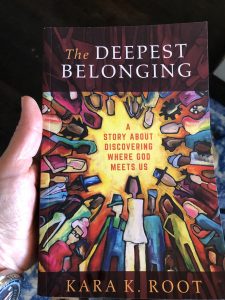
By Kara Root
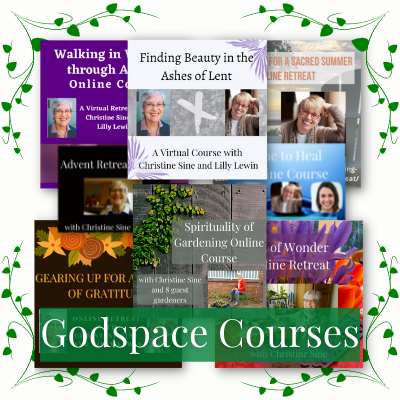 Looking for some inspiration? Consider one of our courses! Most offer 180 days of access, perfect for working through a virtual retreat at your own pace. You can find them all right here! And did you know? We offer discounts if you have purchased a course or virtual retreat from us before or are buying for a group. Email us before check-out for the code!
Looking for some inspiration? Consider one of our courses! Most offer 180 days of access, perfect for working through a virtual retreat at your own pace. You can find them all right here! And did you know? We offer discounts if you have purchased a course or virtual retreat from us before or are buying for a group. Email us before check-out for the code!
words and pictures by June Friesen
This year, spring in the desert of Arizona has been such a blessing. I have gathered a few of my photos from gardens I have visited and trails that I have walked in the past couple of months. As we have been challenged here in Godspace to consider finding beauty in, through and out of ashes the past couple of months, my mind has wandered over the past couple of years as we have tried to make a weekly hiking trip part of our time not to be housebound. This first photo holds a few photos from spring adventures to three different venues. This next photo holds irises in one of our favorite gardens. This area was devastated by a horrendous flood last year in a downpour. The devastation resulted from an area where a large fire had burned over several hundred acres of mountainside. Then a huge rain caused slides of the burned debris to slide down the mountain and block bridges. This required many human hours of cleanup. There was much debris that needed to be removed and of course along with that much of the flower and shrub vegetation was either destroyed and/or compromised in an Arboretum. The irises seemed to be the plant that survived this devastation the best; the daffodils and many other spring shrubs have not yet fully recovered. And so, it may seem or be in our lives – we too may feel as if there has been a mountain slide of unwanted debris. Of course, the most recent worldwide slide of debris was Covid. This brought with it many challenges and times of consideration – what is next? What can I or should I do now? Am I safe? One may even ponder back over ‘life before Covid’ as I have done recently wondering how/when/if life will ever recover to what I enjoyed before such as freedom to travel when, where and how often I want. As I pondered this, I thought of one of my favorite passages of Scripture, Psalm 19.
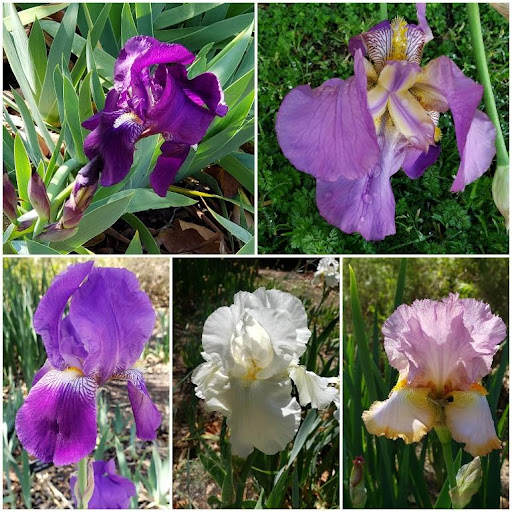
PSALM 19: 7-14 (The Message)
The revelation of God is whole and pulls our lives together.
The signposts of God are clear and point out the right road.
The life-maps of God are right, showing the way to joy.
The directions of God are plain and easy on the eyes.
God’s reputation is twenty-four-carat gold, with a lifetime guarantee.
The decisions of God are accurate down to the nth degree.10 God’s Word is better than a diamond, better than a diamond set between emeralds.
You’ll like it better than strawberries in spring, better than red, ripe strawberries.11-14 There’s more: God’s Word warns us of danger and directs us to hidden treasure.
Otherwise how will we find our way? Or know when we play the fool?
Clean the slate, God, so we can start the day fresh!
Keep me from stupid sins, from thinking I can take over your work;
Then I can start this day sun-washed, scrubbed clean of the grime of sin.
These are the words in my mouth; these are what I chew on and pray.
Accept them when I place them on the morning altar,
O God, my Altar-Rock, God, Priest-of-My-Altar.
As I was reading and pondering these verses, I could not help but be reminded of how involved in our lives God is even though many times and probably most of the time we forget that God is present. The truth of these verses is relevant not only in creation and nature but also in our spiritual lives. Today I find myself challenged as I look at the beauty that nature restores over time. I also find myself challenged in regards to what God desires to now restore, renew and/or rebirth in my spiritual life after this struggle of the past two years.
In this writing I am going to concentrate on verse 10 – likely there will be at least one or more follow-up writings from this theme. “10 God’s Word is better than a diamond, better than a diamond set between emeralds.
You’ll like it better than strawberries in spring, better than red, ripe strawberries.”
NEW BIRTH AFTER DEVASTATION
What will I do?
Where will I go?
Who will help – or will anyone help?
Where is God – they said He would care for me?
Everything that I treasured has been compromised in some way –
My home was flooded with water –
O, it is standing and they say it can be restored –
But can it really be restored – will it ever be the same again?
My fields and garden are covered in debris –
How will I ever be able to plant them again?
Oh, and then the seed I was planning to use –
It too has been destroyed –
Wet, sprouting, molding, and also a fire hazard –
What is ever going to be possible Dear God?
God, my whole life is compromised –
Not just my home, my livelihood, my garden,
But God my whole family is affected in some way –
And so, I have been reminded today that You will help me –
You will help me find an answer –
You, O God, will give me direction –
But then I have to ask – ‘How in the world is any recovery possible?
I am trusting You O God –
I am trusting You also in the devastation I feel in my spirit today –
I am trusting You for the devastation I feel because of so many limitations –
I am trusting You for healing, O God –
I am trusting You for healing in my spirit today –
I am trusting You for healing in all spiritual communities today –
I am trusting You for healing in families today –
I am trusting You for healing in the lives of those broken by situations that could never have been prepared for –
I am trusting You for new beginnings –
New beginnings as I open my spirit to You God for renewal –
New beginnings for others as I allow You to work in and through me –
New beginnings for spiritual communities as creative ways for gatherings and reaching out are considered and implemented –
New beginnings in families as forgiveness is granted and acceptance of recent challenges are faced –
New beginnings in our broken, broken world –
A world that sometimes seems to be without any ray of hope –
Let this new beginning begin in me, O God –
In the Name of the Father, the Son and the Holy Spirit,
Amen and Amen.
 Whatever season your garden is in – winter, summer, spring, or fall – there is something to enjoy and tasks to accomplish. And there is spirituality to put into practice! Find God and community through the richness of soil and the shared values of growth. We have many resources available to help – click here to explore!
Whatever season your garden is in – winter, summer, spring, or fall – there is something to enjoy and tasks to accomplish. And there is spirituality to put into practice! Find God and community through the richness of soil and the shared values of growth. We have many resources available to help – click here to explore!
by James Amadon, originally posted on Circlewood’s Blog The Ecological Disciple
In August of 2017, I was given the opportunity to continue the work of Tom and Christine Sine by becoming the Executive Director of Mustard Seed Associates (now Circlewood). At the heart of my assignment was the care of a 40-acre forest on Camano Island. As I entered the forest for the first time, I was keenly aware of its beauty – and my ignorance. I had no idea how to care for a forest, but I was hopeful that by learning to do so, I would become more rooted in the earth, more empowered to care for the world, and more aware of God’s presence with, in, and through creation. I soon discovered that the path I would need to take to become a forest keeper required acknowledging ignorance, seeking wisdom, and acting with care.
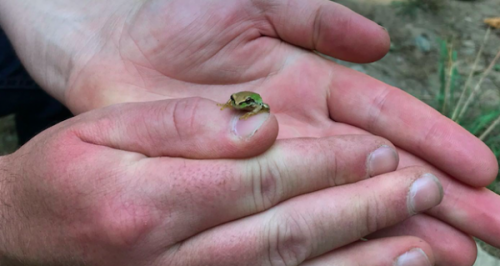
A Pacific Tree Frog in the Circlewood Forest
Beginning in Ignorance
On that first visit, at the edge of a clearing, I noticed a small frog hopping into the surrounding undergrowth. I reached in to see if I could gently pick him up, but came away with a fistful of stinging nettles instead. I had a painful reminder of this experience for a few days as my hand pulsated with what felt like hundreds of tiny stingers. My first thought was that we would need to eradicate this noxious weed from the forest. My second thought, which is often the better to pay attention to, was that I should learn a little bit before making that decision. This turned out to be a wise choice.
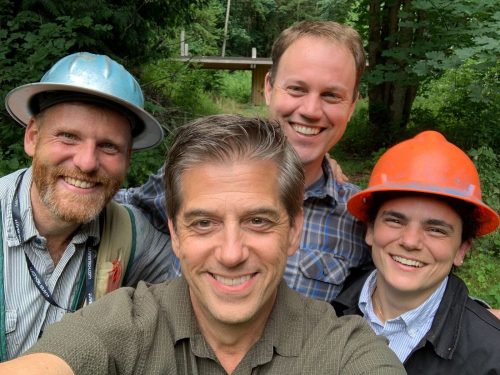
With Forrest Inslee and foresters from the Northwest Natural Resource Group.
From Knowledge to Wisdom
After the incident with the nettles, I began to pray for guides to help me learn about the forest and my role as a caretaker. Before too long, I was connected to the Northwest Natural Resource Group, a non-profit devoted to helping small forest holders learn and practice ecological forestry. They were, quite literally, a godsend. They walked the 40 acres, taught us the different species and composition of tree families, and helped us develop a 30-year conservation plan that would not only preserve, but enhance, the long-term health of the forest. I’ll never forget their Director of Forestry, Kirk Hanson, pulling out a core sample from an 80-year old Grand Fir, cupping his hands to catch the stream of water that flowed from the small hole he had created, and drinking it with relish.
I also began educating myself with books such as Finding the Mother Tree by Suzanne Simard, a forest ecologist who has radically changed the way we understand plant communication and intelligence. This kind of knowledge is more than theoretical understanding, or even a guide to better practices. It has invited me to change my consciousness, or worldview. It has begun to create new pathways of understanding that deepen not just my knowledge, but my connection, to the forest; I feel a growing sense of relationship with the forest, one that is reciprocal. I resonate more and more with a dream that Randy Woodley shares in his book Becoming Rooted.
In this dream, all the plants at Eloheh Farm – both those considered wild and those domestic – stood in front of me. The Dream was simple and pure in its essence: just me standing in front of all the plants, as if I needed to answer to them for something. With one singular voice, they said, “We are healing you!”
This humble knowledge, which begins with an awareness of ignorance, eventually leads to wisdom. And it is wisdom that must guide our actions.
It Takes a Forest to Raise a Village
Over the last five years, I have been working with a wonderful team to design and build a small village for learning and transformation within the forest. When fully developed, the village will be able to host 35 residential students, 50-70 people in cohort learning groups, and 300-500 short-term visitors. It is being designed to be as regenerative and innovative as possible, but also to function as part of the forest, not be an imposition upon it.

Architectural Rendering of Circlewood Village Center
We are listening to the forest to discern where to place the village with minimal disruption to the existing trees and ecology. We are limiting the scope of what we build so that we do not exceed what the forest can support. We have enlisted the help of people who have dedicated their lives to pursuing creative and innovative ways to inhabit places in regenerative ways. Together, we are going through the cycle – ignorance, knowledge, action, repeat – as we refine the design and prepare to build. Our goal is that human habitat within the forest will be a natural addition to the community of creatures that calls it home, and that our presence will contribute to mutual flourishing.
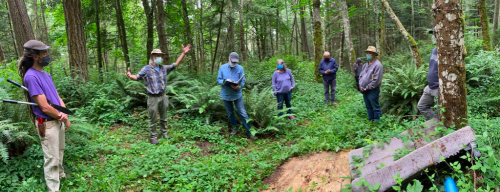
Learning from Permaculturist Doug Bullock of Terra Phoenix Design
A Plateful of Goodness
Back to the nettles. When we invited some local permaculture experts to walk the land and share their wisdom with us, they saw the nettles and declared, “Wow, you’ve got quite a crop growing here!” Turns out, nettle leaves can be eaten straight from the plant (carefully), or boiled and made into soup, tea, pudding, and wine. My colleague, Louise Conner, has harvested nettles from the forest and made a delicious pesto. The long fibers in the nettle’s stem can be made into cords, and the plants offer important butterfly habitat.
I look at our crop of nettles, and the forest as whole, much differently now. I’m not sure I can call myself a forest keeper quite yet, but I’m on my way.
Have you gone through a cycle of ignorance, knowledge, and action that has made you a better earthkeeper? I’d love to hear about it. Please share your questions and comments below, or you can email me directly at james.amadon@circlewood.online.
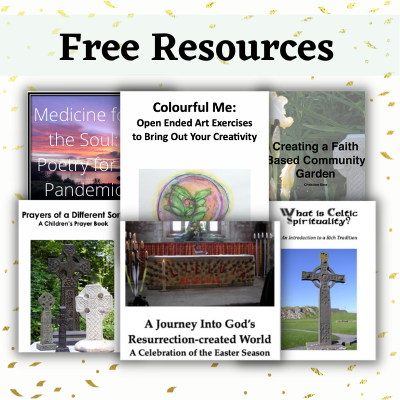 Did you know? We offer many wonderful free resources on our resource page and in our shop! From Advent retreats to coloring pages to poetry and more. Click here to explore our free downloadable offerings and more!
Did you know? We offer many wonderful free resources on our resource page and in our shop! From Advent retreats to coloring pages to poetry and more. Click here to explore our free downloadable offerings and more!
by Sue Duby
It’s coming. I’m struggling to contain my excitement. Wishing the weeks of 70- degree sunshine -“bad hair day” winds – tornado watches – snowflakes – warm sunshine again weather would vanish. Longing for quiet moments on my backyard porch swing, sweet bird songs filling the air, and green shoots of wonder popping up in every garden bed.
The signs say it’s begun. Delicate white blossoms spreading across the branches of our pear tree. Tulips popping up in a massive clump, ignoring the reality of my total neglect. Robins pecking mulch, in hopes of a juicy worm or two. Peaceful magic beginning to unfold, until…
Chuck shouted from his window view: “They’re back!” A glance confirmed it. I swallowed a scream. Daring to hop about my yard and begin their take over … the grackles.
We learned of their ways early last Spring. A grand multitude lodged in the tall branches of our neighbor’s trees. Loud, throaty screeches filled the air for weeks. Cackling to each other. Often crying out in unison for impact. All day long. Chasing every other bird away. Stealing eggs from nests. Lobbying to win the #1 garden bully award. My peaceful oasis totally sabotaged!
“Common Grackles are blackbirds that look like they’ve been slightly stretched. They’re taller and longer tailed than a typical blackbird, with a longer, more tapered bill and glossy-iridescent bodies.” (Don’t let that beauty fool you!)
“Grackles walk around lawns and fields on their long legs or gather in noisy groups high in trees, typically evergreens. They eat many crops . . .and nearly anything else as well, including garbage.” (Add bird eggs to that list!)
“The typical song, made by both males and females, is a guttural squeak, accompanied by high pitched, clear whistles. It lasts less than a second and is often described as sounding like a rusty gate.” (Annoying is too kind a word!)
After a few weeks of growing irritation and frustration, I called a local bird expert. “What can we do????!!” “Well … you can get your shotgun and scare them away or purchase a special sound machine that chases away all wildlife”. Clearly, we took a pass on both options! By mid-May, the flock of grackles flew away, and life as we love it returned.
This round, I purposed to not let their presence steal my joy. Grabbing hold of lessons learned the first time. Remembering that the robins and other birds eventually returned, built nests, had babies and sang their songs. My flowers produced a bounty for my arrangements. Mornings on the porch swing filled my tank. Even with the grackle cackling, Spring wonder still arrived. And after some weeks, they left us alone.
Somehow, their annoying voice consumed me last year. Walking outside, that’s all I could hear. My irritated spirit caused my vision to fog and I missed some of the wonder unfolding right in front of me. My anger simmered at them as my enemy. I complained … a lot. I’m a bit ashamed at allowing such an insignificant voice to take center stage. So much wasted energy and focus. Wondering what I missed by having my “listening” tuned to a single channel.
So very much like our own lives. Voices of so many varied tones, scales, force, and decibels fill our days on a moment-by-moment basis. Tempting us to focus on them alone. Causing distraction. Sucking energy away from what matters. Blurring our view and disrupting our listening ears. All the while, He’s whispering, “Listen to My voice”.
Dialing our listening channel to Him, brings settling and peace in the midst of all the voices clamoring for our attention. Intentional choosing and energy required on our part to stay on that channel and keep it clear. Knowing if we hear His voice first, we can navigate our days (and all the other voices) with grace and peace.
His voice reminds us that …
- We are known by Him – fully and completely. He knows our frame, our desires, our needs, frustrations, and hopes.
“My sheep listen to my voice; I know them, and they follow me.” John 10:27
- He is our protector and guide.
“If my people would only listen to me,
if Israel would only follow my ways,
how quickly I would subdue their enemies
and turn my hand against their foes!” Psalm 81:13-14
- He brings us peace.
“. . .but whoever listens to me will live in safety
and be at ease, without fear of harm.” Proverbs 1:33
Lord, give us wisdom to pass by voices that are not Yours. . . to tune them out of range … to keep our ears and hearts fully ready to hear Your voice alone … remembering that Your voice is what we most need every moment of every day.
 Explore what childlike characteristics shape us into the people God intends us to be. Be encouraged to develop fresh spiritual practices that engage all our senses and help us to live a new kind of spiritual life that embraces the wonder and joy that God intends for us. Embrace the gifts of Awe and Wonder; gifts that sustain us, practices that are relevant and important in these times. Whether the book, prayer cards, retreats, or supplemental handouts, you can find it all in our shop!
Explore what childlike characteristics shape us into the people God intends us to be. Be encouraged to develop fresh spiritual practices that engage all our senses and help us to live a new kind of spiritual life that embraces the wonder and joy that God intends for us. Embrace the gifts of Awe and Wonder; gifts that sustain us, practices that are relevant and important in these times. Whether the book, prayer cards, retreats, or supplemental handouts, you can find it all in our shop!
Last week was both Earth week and Easter week, a convergence that held great significance for me as I grapple with the seeds of a new book planted but not yet birthed in my soul. It is a book about restoring the rhythms and seasons and our connection to the earth that God intends for me.
As I begin my journey I have chosen three books to guide me. Each is very different, but already they have inspired me and stretched my thinking.
The first is A Watered Garden: Christian Worship and Earth’s Ecology where Benjamin Stewart points out that Christians in the Southern Hemisphere talked about the disconnect between the cycles of the liturgical year and the ecological year in the southern hemisphere, which in turn reminded Northern Hemisphere Christians of the deep connection that there should be. Yes that’s it, I thought. Even though I live in the northern hemisphere and can delight in the wonder of spring bursting forth all around me at Easter, I still struggle with those who do not live with these symbols – be it in the Southern Hemisphere, at the equator or in urban areas with little if any greenery. They too need symbols of hope and resurrection that connect them to the earth and to the rhythms of their lives. How do we help others connect the story of Easter to the story of creation in the same way my first spring in the northern hemisphere did for me?
The second book is Worshiping in Season – Ecology and Christ Through the Liturgical Year by Joseph E Bush Jr., a fascinating book that walks readers through the liturgical seasons, helping us make connections to our worship and creation that most of us are unaware of.
Liturgically, Ash Wednesday launches us on a Lenten journey that concludes in many churches with baptismal waters on Easter, waters of renewal and of rebirth. We see Earth walks with us, walks in us, on this journey. Worshiping in Season – Ecology and Christ Through the Liturgical Year 25.
As I thought about this today, I was reminded of what I wrote a few years ago in my book Return to Our Senses: Reimagining How We Pray :
Blessing of water is symbolic, not just of life, but of transformation. Every use of water transforms and renews. When we drink it we rehydrate dry and thirsty cells, we cleanse toxins from our bodies and we revitalize our energy. When we sprinkle it on our gardens it renews the dry and thirsty ground and gives life to every plant. When it rains from the clouds it refreshes and renews the very air we breathe.
Maybe a vial of water would be a more appropriate Easter symbol than an empty cross.
My third guide is The Book of Hope: A Survival Guide for Trying Times by Jane Goodall and Douglas Abrams. I am enthralled by her stories of the resilience of trees that survived the devastation of the atomic blast to Hiroshima at the end of WWII . I wept as I read about the 2 five-hundred-year-old camphor trees that survived. Not a single leaf survived but they were alive and every spring the tree puts out new leaves. Many Japanese regard them as holy monuments of peace and survival.
As I read about these trees I realize how desperately we all need these kinds of symbols to help us connect more intimately to earth symbols, which are often far more powerful than the symbols we use.
I experienced that this year as I celebrated Lent by using my theme “Beauty out of Ashes.” My Beauty sign – created out of the ashes of one of my masks, still sits on my desk. It has been a wonderful seasonal symbol that could also be used by those recovering from fires, war or drought. We all need these kinds of connections to remind us that there is always hope in the ashes.
So how do we find them? Some of us do not connect strongly to the traditional liturgical themes but unfortunately have not found other themes to replace them. In fact some of the worship songs we use disconnect us even further from creation and our responsibility to it. Others have never integrated their liturgical worship to creation. That is one theme I will explore in my new book and as I do so I am very grateful for my friend Lilly Lewin and her ability to connect everyday items to the seasons, not just the liturgical seasons, but also the seasons of world events we are impacted by. Her most recent Freeerange Friday: Easter Prayers for Ukraine and Russia, where she uses sunflowers, the national flower of Ukraine, and chamomile flowers, the national flower of Russia, as a focus for prayer.
What symbols help you maintain your connections between worship and creation? What other suggestions do you have?
NOTE: As an Amazon Associate I receive a small amount for purchases made through links above. Thank you for supporting Godspace in this way.
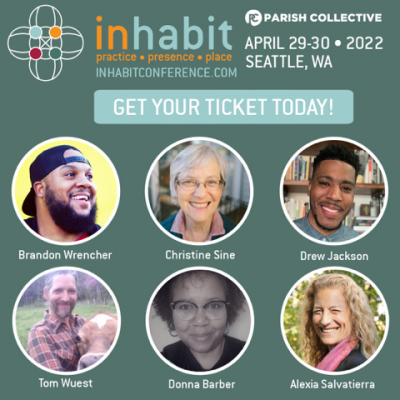 Join Christine Sine, Tom Sine, and others for Inhabit 2022 on April 29-30th in Seattle- a live conference by Parish Collective. Explore stories of hope and be encouraged to be the church in your neighborhood. You are not alone – the everyday realities are carried by us all. Click here for more info!
Join Christine Sine, Tom Sine, and others for Inhabit 2022 on April 29-30th in Seattle- a live conference by Parish Collective. Explore stories of hope and be encouraged to be the church in your neighborhood. You are not alone – the everyday realities are carried by us all. Click here for more info!
A contemplative service with music in the spirit of Taize. Carrie Grace Littauer, prayer leader, with music by Kester Limner and Andy Myers.
Permission to podcast/stream the music in this service obtained from One License with license #A-710-756 with additional notes below:
“By The Mark” Written by Gillian Welch and David Rawlings
“Što Oko Ne Vidje (What No Eye has Seen)” By the Taizé community, copyright 2010, all rights reserved by GIA/Les Presses de Taizé
“Kristus, Din Ande / Jesus, Your Spirit In Us” Copyright and all rights reserved by GIA/Les Presses de Taizé
“Nothing But The Blood” Traditional American Spiritual
Vocal arrangement by Kester Limner, shared under the Creative Commons License, Attribution (CC-BY)
Thank you for praying with us!
As an Amazon Associate, I receive a small amount for purchases made through appropriate links.
Thank you for supporting Godspace in this way.
When referencing or quoting Godspace Light, please be sure to include the Author (Christine Sine unless otherwise noted), the Title of the article or resource, the Source link where appropriate, and ©Godspacelight.com. Thank you!


